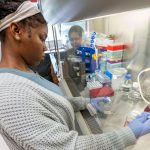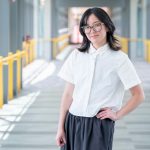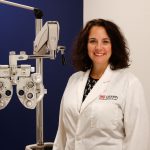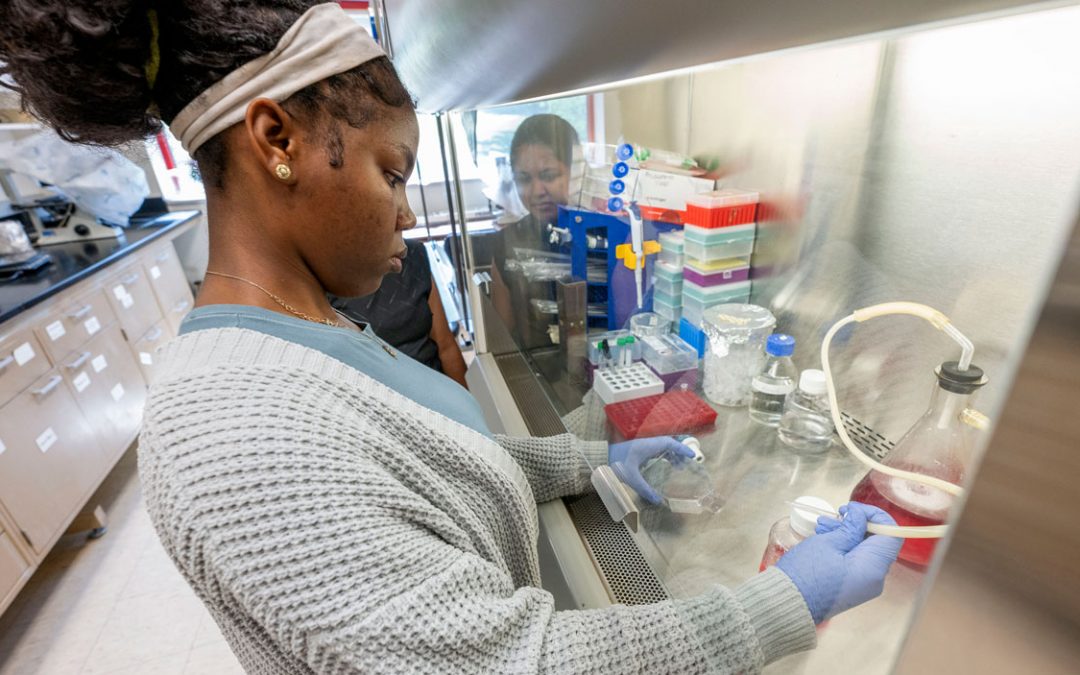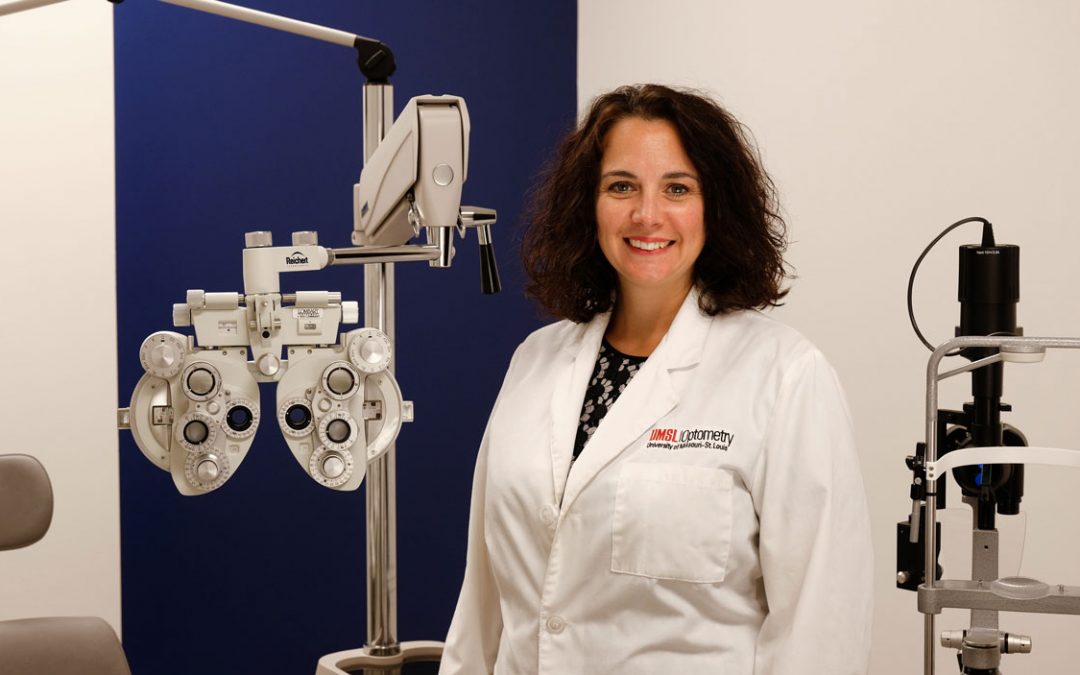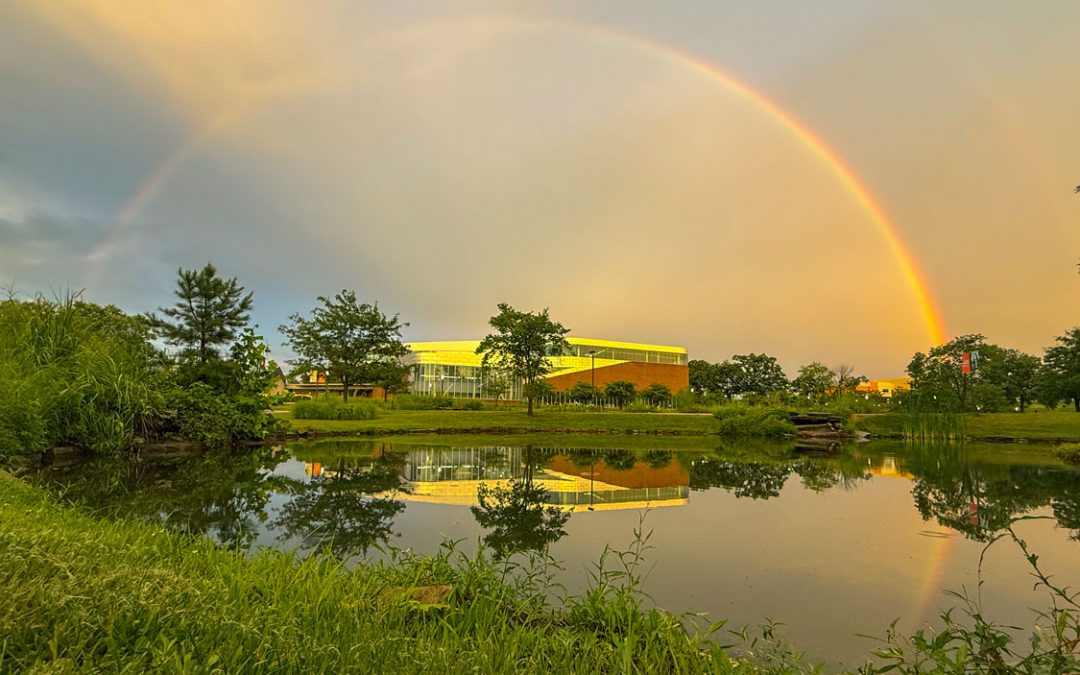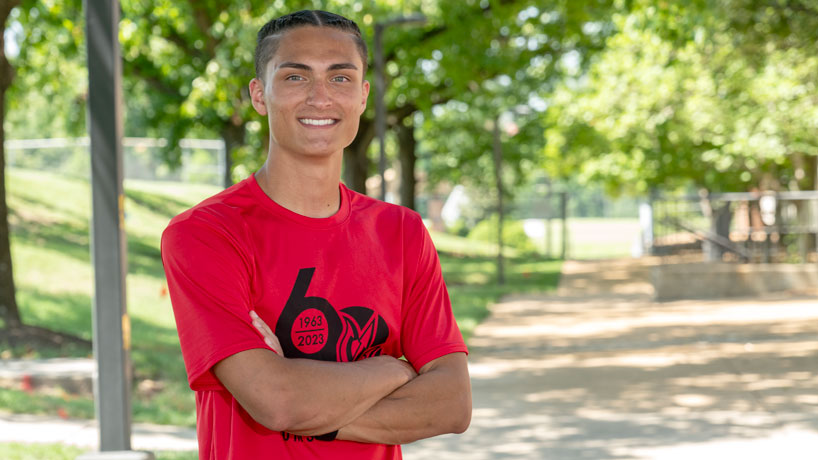
Gabe Stanislawski, an undergraduate clinical nursing student at UMSL, is working on a study that examines the relationships among chosen superpowers and categories on a self-perception scale. (Photo by Derik Holtmann)
For years, Gabe Stanislawski has been asking friends, family and members of his church the same question: If you could pick one superpower, what would it be – and why?
As someone who journals frequently, the question started as a way to reflect, but Stanislawski was also interested in what different answers could tell him about each person who responded.
“I’ve always been very intrigued about what makes a person tick, and I also believe that everyone has some kind of gift that they can give to the world in some way,” he said. “And that can also be reflected in their superpower – an extra trait that they can give to the world. A superhero has that gift already; they find that trait, and then they’re able to apply it for the world. That’s kind of where that question came from – I wanted to know a little bit about that person.”
As Stanislawski has talked to different people, he’s noticed some people choosing the same superpower as others, but for different reasons. One person might choose teleportation, for instance, simply to move around quickly, while another would choose it to be able to move around someone in need. He’s also learning a lot about what the chosen superpower says about the participant and their own beliefs. Many participants who identify as religious, for instance, tend to choose healing as their superpower.
As he started to notice some interesting patterns in his conversations, Stanislawski, an undergraduate clinical nursing student starting his final semester in the College of Nursing at the University of Missouri–St. Louis, realized he might have an interesting psychosocial study on his hands. About a year ago, he consulted with Assistant Teaching Professor Joshua Minks and got to work.
Stanislawski created a study design that examines the relationships among chosen superpowers and categories on a self-perception scale. For the study, which Stanislawski is currently preparing for submission for IRB approval, he narrowed the choice of superpowers down to include traits such as healing, teleportation, shapeshifting, magic and telepathy, intentionally keeping the choices broad so that participants can choose one and apply it however they like.
“The big kicker is the follow-up question – how would you use your superpower?” he said. “That’s how you can see a difference between what we call a self-profitable trait or an other-profitable trait. It’s kind of selfless or selfish; they either want that extra power so that they can profit themselves or have a benefit for other people.
“Comparing it to superpowers, we have superheroes and super villains. Super villains typically have the self-profitable traits, so they have some kind of trauma that happened in their life and they believe that this happened to them, and not for them, essentially. And then it’s the other way around for superheroes – they are able to perceive themselves and their trauma in a very healthy manner and apply it to the rest of their life and help society.”
Part of Stanislawski’s study will involve creating and implementing an assessment tool that builds on existing self-criticism and self-reassurance scales, supplemented with questions about superpowers. Combining the two allows him to see correlations between self-perception and chosen superpowers. Stanislawski hopes to use the study to analyze people who have experienced trauma or are dealing with mental disorders such as PTSD or schizophrenia to better understand their self-perception and in, turn, provide them with better care.
In addition to his studies in the College of Nursing, Stanislawski also plays as a midfielder on the UMSL men’s soccer team. While it’s certainly time-consuming balancing his nursing workload with being a student-athlete, he also credits it with teaching him discipline.
“If you enjoy it, it doesn’t feel like a chore,” he said. “The other athletes and I have grown up playing our sports, so it’s something that’s always been there in in our lives. I believe that everyone should, at some point in their life, play a sport because it helps you learn how to discipline yourself and make you apply all that discipline into the rest of your life. If you can learn how to discipline yourself in one aspect of your life, you can eventually apply it to the rest of your life. For me, soccer was a good start to that.”
During his final semester in the College of Nursing, Stanislawski is completing his preceptorship in the cardiothoracic ICU at Barnes-Jewish Hospital, where he plans to work for a year before applying to anesthesia school. He’s known he wanted to be a nurse anesthetist since high school, when he was able to shadow a family friend in the field. He’s enjoyed the process of becoming a nurse and credits both his fellow students and his professors with creating such a welcoming atmosphere in the College of Nursing.
“The professors love to get to know the students personally, and I appreciate that a lot,” he said. “If you go and approach them, they’re willing to talk. I’ve gotten very close to Dr. Minks. Of course, it’s difficult and time-intensive, but all the students are hardworking and it’s a good environment to be in. The students themselves make it a very good community – you feel like you’re meant to be there.”


